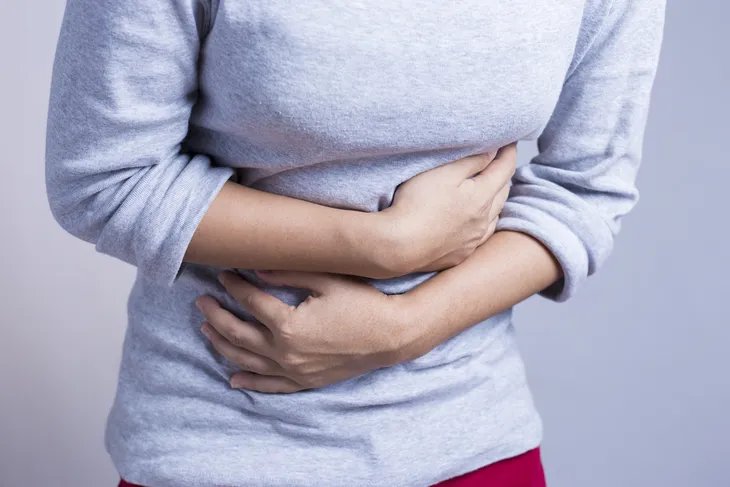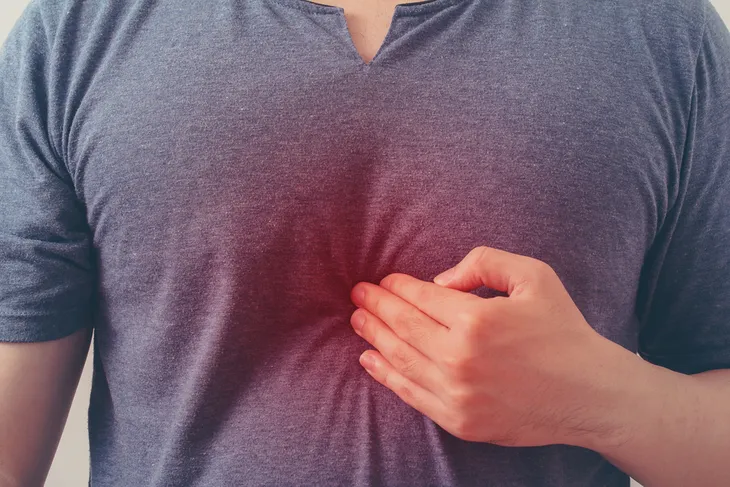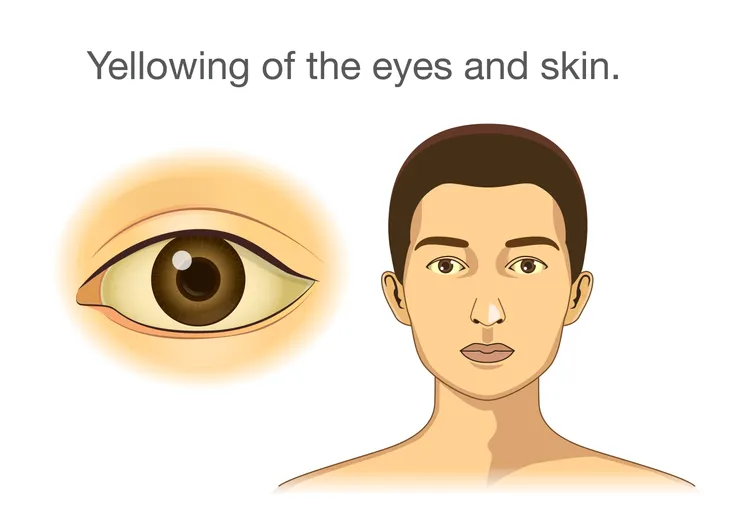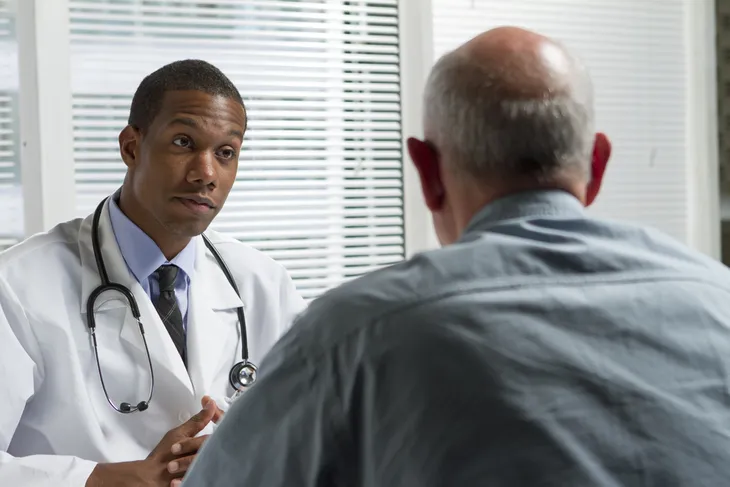- Stomach cancer occurs when an abnormal growth of cells develops in the stomach.
- Catching stomach cancer in the early stages can be a challenge because the symptoms can resemble other conditions or can be so mild that they’re even ignored.
- If you have any of these symptoms and there is no known cause, or if the symptoms are getting worse, it’s time to see a doctor.
Stomach cancer, also known as gastric cancer, is one of the most frightening forms of cancer. This type of cancer typically emerges in the mucus-producing cells that line the stomach (called adenocarcinoma). The Mayo Clinic explains that stomach cancer often begins as a malignant tumor that can spread or metastasize to other areas of the body.
Thankfully, the number of stomach cancer cases, particularly the kind that develops in the main part of the stomach, has been steadily declining in the U.S. each year. On the other hand, cancer in the top part of the stomach (cardia), where the stomach meets the esophagus, has become more common. This is why it’s important to get informed. Here are the most common signs and symptoms of stomach cancer…
Upset Stomach
One of the reasons stomach cancer can be so dangerous is that it’s often confused with fairly typical (and relatively harmless) stomach problems, such as run-of-the-mill nausea. Because we often associate an upset stomach with the foods we eat, it can be easy to miss stomach cancer in its early and even intermediate stages.
If you experience an upset stomach for an extended period of time, don’t just assume that it’s related to your diet. Talk to your doctor about the issue and ask him or her about tests for stomach cancer.
Weight Loss
In our image-obsessed society, we typically see weight loss as a step in the right direction when it comes to health. But it can actually be a sign that a major health problem, such as stomach cancer, is beginning to emerge.
In fact, one of the major symptoms of the onset of stomach cancer is unexplained weight loss. If you find that you’re losing weight and have not made major changes to your diet or exercise regime, talk to your doctor about the issue. It’s also wise to speak with your doctor if you find that you’ve suddenly lost all interest in food and have very little appetite.
Stomach Pain
An upset stomach is no fun. It can leave us feeling so uncomfortable that we can spend hours running to the bathroom. It can also make carrying out daily activities—from going to work to playing with the kids—just about impossible.
However, stomach pain is a whole other matter. It’s acute (sudden) pain in the abdomen, often in the area surrounding the navel. This could be the result of swelling and buildup of fluid, both of which can be caused by the emergence of stomach cancer. If you regularly feel pain in this part of your body, talk to your doctor right away.
Feeling Full After Eating
Those of us who have been on a diet know the biggest challenge can be knowing when to say “enough is enough” and stop eating. That’s because eating often becomes something of a therapeutic process for people who have trouble with weight management.
However, feeling full can actually be a sign that stomach cancer is beginning to emerge. If you sit down to a meal and no longer feel hungry after just a few bites, there may be cause for concern. Talk to your doctor about the issue.
Heartburn
Acid reflux, or heartburn, has now become one of the most prevalent health issues in America. When you think about it, it’s not particularly surprising. After all, many of the foods Americans love, such as fried and spicy foods, are closely associated with heartburn or indigestion.
The good news is that heartburn can be treated with over-the-counter (OTC) medications. The bad news is that, should these problems persist, they may be a sign of stomach cancer. If you have regular issues with heartburn and don’t get relief from OTC treatments, talk to your doctor right away.
Vomiting
Having an upset stomach from time to time is one thing, but regularly vomiting is a whole other problem. Put simply, vomiting on a regular basis is anything but normal and can be a symptom of many different problems, not all of which are associated with the stomach.
That’s why it’s important to talk to your doctor if you find that you vomit involuntarily more than once or twice a month. This is especially important if the vomiting is violent in nature or if there is evidence of blood in the vomit, as this could be a sign of stomach cancer.
Advanced Symptoms of Stomach Cancer
When cancer spreads beyond the stomach, this is called metastatic stomach cancer. This means the cancer is more advanced and as such, there are other advanced symptoms that come with it.
Cancer Treatment Centers of America says some signs of advanced stomach cancer may include blood in the stool, belly pain, jaundice (yellowing of the eyes and skin), and difficulty swallowing. A build-up of fluid or swelling in the abdomen is also a symptom.
When to See a Doctor
Catching stomach cancer in the early stages can be a challenge because the symptoms can resemble other conditions or can be so mild that they’re even ignored. However, if you have any of these symptoms and there is no known cause, or if the symptoms are getting worse, it’s time to see a doctor.
Your doctor will evaluate your symptoms and if they suspect stomach cancer they can perform a variety of tests to confirm a diagnosis. Healthline says your doctor will usually start with a physical exam to check for abnormalities but may require other tests, including upper gastrointestinal endoscopy, imaging tests (such as a computed tomography scan and X-rays), and a biopsy.
Do Men and Women Experience the Same Symptoms?
Stomach cancer can develop in anyone, however, it’s more common in men. That said, regardless of gender, both men and women experience similar symptoms of stomach cancer. Cancer Treatment Centers of America says it’s projected that there will be roughly 26,380 new cases of stomach cancer in the U.S. in 2022.
You might also be wondering if children experience the same symptoms. Healthline points out that children with stomach cancer may experience constipation or diarrhea as an additional symptom, however, the rest of the symptoms are the same as for adults.
Stomach Cancer Screening
Cancer Treatment Centers of America says stomach cancer is hard to treat because it’s typically advanced by the time it’s diagnosed. This is why stomach cancer screening may be necessary.
The source points out that routine screenings aren’t usually recommended for most people as they are for other types of cancers (such as breast cancer or colon cancer) but routine screening might be a good precautionary for individuals with an increased risk. Let’s take a look at who has an increased risk next.
Stomach Cancer Risk Factors
While anyone can develop stomach cancer, some have an increased risk. For starters, Cancer Treatment Centers of America says seniors who have chronic gastric atrophy or pernicious anemia may be at an increased risk. Individuals who have had a partial gastrectomy (the surgical removal of part of their stomach) and individuals with a history of stomach polyps also have an increased risk.
The source says other factors that may increase the risk of stomach cancer include:
- Individuals with familial adenomatous polyposis
- Individuals with hereditary nonpolyposis colon cancer
- A history of the helicobacter pylori (H. pylori) stomach infection, Epstein-Barr virus, or intestinal metaplasia
- Family history (having an immediate family member with stomach cancer)
- Eating an unhealthy diet rich in salt and smoked foods
- Being older
- Being male
- Smoking
If you’re worried about your risk of stomach cancer, talk to your doctor.
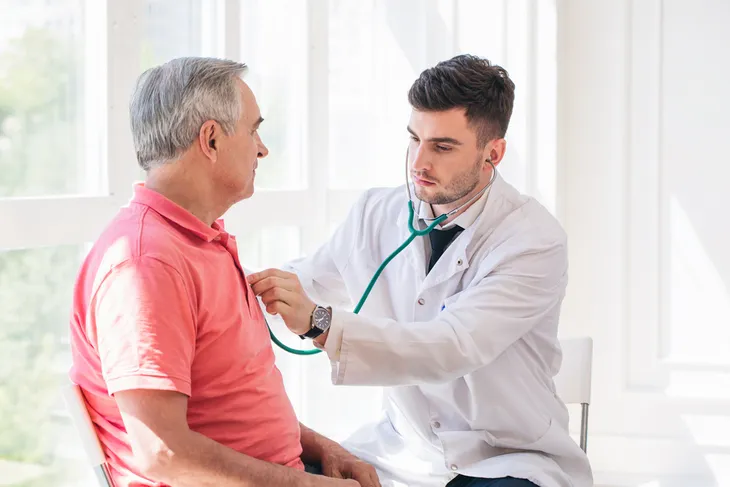 Shutterstock/iVazoUSky
Shutterstock/iVazoUSkyPrevention
While there is no surefire way to prevent stomach cancer, there are things you can do that may help decrease your risk. For starters, the Mayo Clinic says managing a healthy weight can help reduce your risk but you should talk to your doctor to find out what a healthy weight is for you, and how much weight you should aim to lose.
The source also says a healthy diet rich in fruit and vegetables and low in salty and smoked foods is also a great prevention step you can take. If you smoke, it’s time to quit and if you don’t smoke, don’t start. Smoking doesn’t only increase your risk for stomach cancer but other types of cancer too.



